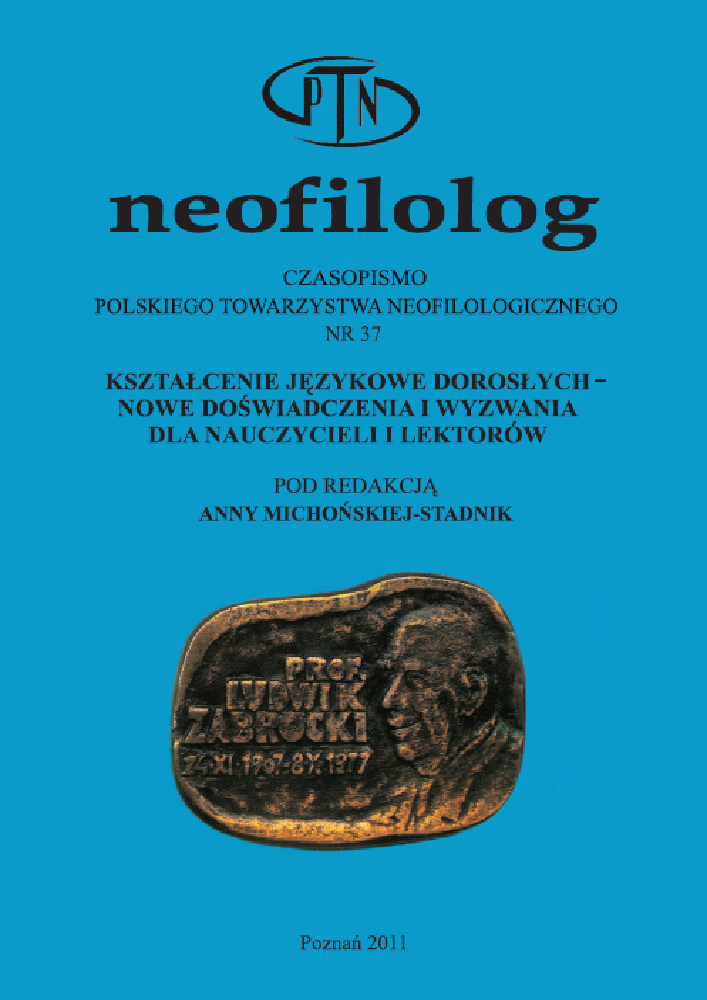Abstrakt
The paper presents a sample of analysis of EU project with regard to ICT application in foreign language teaching and language technology. The analysis is based upon the authors’ observation that by exploring a number of at least 75 projects in terms of their participants, framework programs and scope, some general tendencies can be revealed. The tendencies concern EU research and member state engagement in the aforementioned fields. Having analyzed the data the authors define the nature of the studied projects (educational vs. scientific), point to the most active and beneficial member states and draw models of public and private units cooperation in European research consortiums. Additionally, the analysis presents the first step for further study with regard to particular ICT-tool usage in foreign language learning/teaching in a particular EU country.
Bibliografia
Bayne S., Ross J. 2007, The ‘digital native’ and ‘digital immigrant’: a dangerous opposi-tion, Annual Conference of the Society for Research into Higher Educa-tion (SRHE) 12.2007, http://www.malts.ed.ak.uk. DW: 01.06.2011.
Directorate General Education and Culture at the European Commission 2002, The Impact of Information and Communications Technologies on the Teaching of For-eign Languages and on the Role of Teachers of Foreign Languages, http://ec.europa.eu/education/policies/lang/doc/ict.pdf. DW: 01.03.2010.
Education and Culture Executive Agency (EACEA) 2009, Study on the Impact of Information and Communications Technology (ICT) and New Media on Language Learning, Ellinogermaniki Agogi, http://eacea.ec.europa.eu/…/study_ impact_ict_new_media_language_learning/executive_summary_en.pdf. DW: 02.07.2010.
Euro Languages Net, Lingua Products Fair, http://www.euro-languages.net/sdm/?Command=LPF. DW: 01.06.2010.
Eurobarometr 243 2005, Europejczycy i ich języki. Podsumowanie, http://ec.europa.eu/public_opinion/archives/ebs/ebs_243_sum_pl.pdf. DW : 29.08.2008.
European Commission, Cordis: 7FP: ICT: Language Technologies, http://cordis.europa.eu/fp7/ict/language-technologies/portfolio_en.html. DW : 01.06.2010.
European Commission ICT Research in FR7, ICT Challenge 4: Digital Libraries and Content – Intelligent Information Management: Work Programme for 2009-2010, http://cordis.europa.eu/fp7/ict/content-knowledge/fp7_en.html. DW: 25.09.2010.
European Commission ICT Research in FR7, Language Technologies: ICT Work Pro-gramme 2011-2012, http://cordis.europa.eu/fp7/ict/language-technologies/ related-docs_en.html. DW: 25.09.2010.
Growth, Competitiveness, Employment: The Challenges and Ways Forward into the 21st Century – White Paper, Parts A and B. COM (93) 700 final/A and B, 5 De-cember 1993. Bulletin of the European Communities, Supplement 6/93, http://aei.pitt.edu/1139/. DW: 01.10.2010.
Guo R. X., Dobson T., Petrina S. 2008. Digital Natives, Digital Immigrants: An Analysis of Age and ICT Competency in Teacher Education, Journal of Educational Computing Research, v38 n3 s. 235-254, 2008 http://baywood.metapress.com/link.asp?target=contribution&id=Q4565NG624514844. DW: 01.06.2011.
High-level Group chaired by European Commissioner Martin Bangemann, Europe and the Global Information Society Bangemann report recommendations to the Europe-an Council, http://ec.europa.eu/archives/ISPO/infosoc/backg/bangeman. html#action_plan. DW: 01.10.2010.
Holton, D. 2010. The Digital Natives/Digital Immigrants Distinction Is Dead, Or At Least Dying, EdTechDev – developing educational technology, http://edtechdev.wordpress.com/2010/03/19/the-digital-natives-digital-immigrants-distinction-is-dead-or-at-least-dying/. DW: 01.06.2011.
International Cooperation, Participation in EU Education and Training Programmes, http://internet.ktu.lt/en/kut/trysiai/LLP_projects.html. DW: 01.06.2010.
Kennedy, G., Dalgarno, B., Bennett, S., Judd, T., Gray, K. & Chang, R. 2008. Immi-grants and natives: Investigating differences between staff and students’ use of technology. (w:) Hello! Where are you in the landscape of educational technology? Pro-ceedings ascilite Melbourne 2008, http://www.ascilite.org.au/conferences/melbourne08/procs/kennedy.pdf. DW: 08.03.2010.
Prensky, M. 2001. Digital Natives, Digital Immigrants, On the Horizon, MCB Univer-sity Press, Vol. 9 No. 5, October 2001 http://www.marcprensky.com/. DW: 09.03.2010.
Licencja
Prawa autorskie (c) 1970 Marta Borowiak-Dostatnia, Anna Zięba

Utwór dostępny jest na licencji Creative Commons Uznanie autorstwa – Bez utworów zależnych 4.0 Międzynarodowe.
Przedstawiany utwór (artykuł) upubliczniany jest na podstawie umowy z autorem i na licencji Creative Commons Attribution-NoDerivatives 4.0 International (CC BY-ND 4.0).
Użytkownicy mają obowiązek podania wraz z rozpowszechnionym utworem, informacji o autorstwie, tytule, źródle (odnośniki do oryginalnego utworu, DOI) oraz samej licencji;
- bez tworzenia utworów zależnych,
- utwór musi być zachowany w oryginalnej postaci.
Uniwersytet im. Adama Mickiewicza w Poznaniu zachowuje prawo do czasopisma jako całości (układ, forma graficzna, tytuł, projekt okładki, logo itp.).
